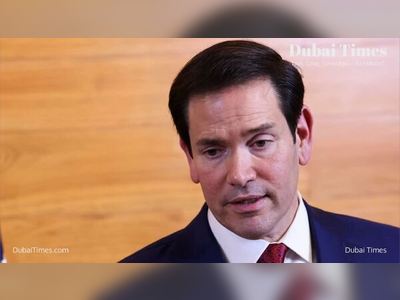Shifting Dynamics in US-Europe Relations Amid Trade Tensions
Recent developments indicate a fundamental change in the strategic partnership between the US and Europe, alongside growing concerns in the US aerospace sector regarding looming tariffs.
The relationship between the United States and Europe is undergoing a significant transformation, marked by rising apprehension regarding the US's reliability as a guarantor of European security.
A recent statement from a British official pointedly asserted that the US can no longer be considered a dependable protector of Europe's security.
Since the end of World War II, during which the US participated in military actions against the Axis powers (Germany, Italy, Japan), it has been viewed as a 'big brother' on whom Europe could rely for security and prosperity.
Throughout the Cold War, the US served as a crucial strategic counterbalance to the Soviet Union and the Eastern Bloc, solidifying its role as a key ally for European nations.
However, recent trends in the US political landscape signal a shift towards a more isolationist policy.
The rise of right-wing sentiments within American institutions and public opinion, notably reflected in recent electoral outcomes, has led to a clear divergence from commitments to Western allies and global leadership roles, including those in third nations and in the broader framework of globalization.
The 'America First' policy articulated by President Donald Trump emphasized prioritizing American interests above all, even at the expense of relationships with neighboring countries such as Mexico and Canada, as well as with NATO allies.
This indicates a new norm where commitments that incur costs for the US are viewed unfavorably, while agreements that yield financial benefits for the US treasury are readily accepted.
As the Trump administration conditions continue to shape US foreign policy, experts suggest that this era will be characterized by a deliberate distancing from traditional leadership responsibilities, resulting in a transactional approach to international relations.
Concurrently, the aerospace industry in the US is voicing alarms over potential tariffs introduced by the Trump administration.
The US Department of Commerce, at Trump's request, launched an investigation on May 1 to determine whether to impose tariffs ranging from 10% to 20% on commercial aircraft and related parts, including engines.
Industry representatives, however, have expressed that they do not seek such protection measures.
The Aerospace Industries Association (AIA) submitted correspondence to Commerce Secretary Howard D. Shelanski, cautioning that imposing broad-based tariffs could undo decades of progress in the sector and disrupt domestic supply chains.
Industries have until June 3 to submit their feedback regarding the proposed tariffs.
Following this, Secretary Shelanski indicated that Washington aims to finalize its tariff standards on aircraft components by the end of the month.
He asserted that the initiative is intended to bolster the industry, but associations such as AIA and Airlines for America (A4A) have conveyed their concerns that these tariffs may ultimately harm American manufacturers.
The AIA highlighted that, unlike other sectors, the civil aviation industry prioritizes local production of high-value parts and final assembly.
In 2023, exports from the aerospace and defense sectors in the US reached approximately $135.9 billion, with $113.9 billion attributed solely to civil aviation, which has allowed for a trade surplus of $74.5 billion.
This sector also saw an investment of $34.5 billion in research and development.
Employing over 2.2 million people across more than 100,000 companies, the aerospace sector generated goods valued at around $545 billion in 2023. In its response to Shelanski, Airlines for America underscored the importance of the international 'Open Skies' agreement, which has historically mitigated tariffs and trade barriers over the last half-century.
The association argued that the civil aviation sector represents a success story that aligns with the goals of the Trump administration, stating that the US dominates the global civil aerospace market with 84% of production being domestically sourced.
They asserted that the existing trade framework has enhanced the economy and national security, establishing its critical role in sustaining national security in the long term.
Experts warn that the proposed tariffs could hinder manufacturers, posing risks to the delicate supply chains that are still recovering from the impacts of the COVID-19 pandemic.
A recent statement from a British official pointedly asserted that the US can no longer be considered a dependable protector of Europe's security.
Since the end of World War II, during which the US participated in military actions against the Axis powers (Germany, Italy, Japan), it has been viewed as a 'big brother' on whom Europe could rely for security and prosperity.
Throughout the Cold War, the US served as a crucial strategic counterbalance to the Soviet Union and the Eastern Bloc, solidifying its role as a key ally for European nations.
However, recent trends in the US political landscape signal a shift towards a more isolationist policy.
The rise of right-wing sentiments within American institutions and public opinion, notably reflected in recent electoral outcomes, has led to a clear divergence from commitments to Western allies and global leadership roles, including those in third nations and in the broader framework of globalization.
The 'America First' policy articulated by President Donald Trump emphasized prioritizing American interests above all, even at the expense of relationships with neighboring countries such as Mexico and Canada, as well as with NATO allies.
This indicates a new norm where commitments that incur costs for the US are viewed unfavorably, while agreements that yield financial benefits for the US treasury are readily accepted.
As the Trump administration conditions continue to shape US foreign policy, experts suggest that this era will be characterized by a deliberate distancing from traditional leadership responsibilities, resulting in a transactional approach to international relations.
Concurrently, the aerospace industry in the US is voicing alarms over potential tariffs introduced by the Trump administration.
The US Department of Commerce, at Trump's request, launched an investigation on May 1 to determine whether to impose tariffs ranging from 10% to 20% on commercial aircraft and related parts, including engines.
Industry representatives, however, have expressed that they do not seek such protection measures.
The Aerospace Industries Association (AIA) submitted correspondence to Commerce Secretary Howard D. Shelanski, cautioning that imposing broad-based tariffs could undo decades of progress in the sector and disrupt domestic supply chains.
Industries have until June 3 to submit their feedback regarding the proposed tariffs.
Following this, Secretary Shelanski indicated that Washington aims to finalize its tariff standards on aircraft components by the end of the month.
He asserted that the initiative is intended to bolster the industry, but associations such as AIA and Airlines for America (A4A) have conveyed their concerns that these tariffs may ultimately harm American manufacturers.
The AIA highlighted that, unlike other sectors, the civil aviation industry prioritizes local production of high-value parts and final assembly.
In 2023, exports from the aerospace and defense sectors in the US reached approximately $135.9 billion, with $113.9 billion attributed solely to civil aviation, which has allowed for a trade surplus of $74.5 billion.
This sector also saw an investment of $34.5 billion in research and development.
Employing over 2.2 million people across more than 100,000 companies, the aerospace sector generated goods valued at around $545 billion in 2023. In its response to Shelanski, Airlines for America underscored the importance of the international 'Open Skies' agreement, which has historically mitigated tariffs and trade barriers over the last half-century.
The association argued that the civil aviation sector represents a success story that aligns with the goals of the Trump administration, stating that the US dominates the global civil aerospace market with 84% of production being domestically sourced.
They asserted that the existing trade framework has enhanced the economy and national security, establishing its critical role in sustaining national security in the long term.
Experts warn that the proposed tariffs could hinder manufacturers, posing risks to the delicate supply chains that are still recovering from the impacts of the COVID-19 pandemic.
Translation:
Translated by AI











